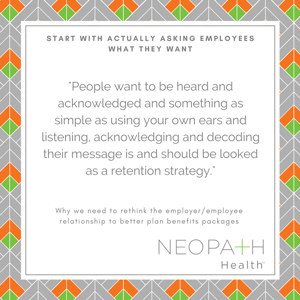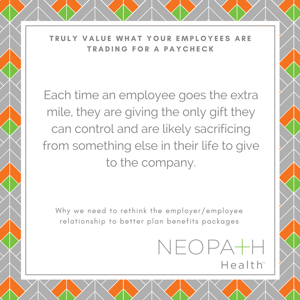Working with professionals in the HR environment for the last 15 years I’ve heard a lot of stories. Plenty of you won’t believe this, the “what is going through their head” stories for sure. These are the ones where we diligently mask for privacy but use as the one uppers, the one in our back pocket to say I can beat that, wait til you hear this! But, for all the crazy stories we may have heard or experienced, we often forget about the hundreds of inspiring ones. The employee that made a lasting and lifelong impact on you, the team and the organization. The unicorns - the hard to find - highly valuable team members that make things happen.
"The Unicorns - the hard to find - highly valuable team members that make things happen. It's time to get creative with building a modern benefits program to attract and retain more unicorns." [Click to Tweet!]
US employers invest billions of dollars each year aiming for the game changing dynamic individual. We run our ads online, in the paper (maybe?) and invest in strategic recruiting relationships with outside firms to help fill our open positions. As unemployment rates reach multi-decade lows and the market for the dynamic employee tightens, it is now time to get creative in how to attract and retain these “unicorns”.Often, those efforts lean on outstanding benefits programs. But to get creative with building a modern benefits program - we first need to rethink the employee/employer relationship as it applies to the modern workplace. Then and only then, can we do the work of building world class benefits packages to attract and retain top talent, in a competitive market.
Download our Anatomy of the Modern Benefits Package to learn more.
Start with actually asking employees what they want
 The power of listening is one of the most underrated skills in the professional world
The power of listening is one of the most underrated skills in the professional world
It’s easy to wrap around our own required tasks during the day but having a strong pair of ears is vital. As we focus our teams on common goals and aim for productivity, having a finger on the pulse of our workforce is essential to success.
Clear communication is a two-way street, send message and hopefully that message is received, decoded and understood.
People want to be heard and acknowledged and something as simple as using your own ears and listening, acknowledging and decoding their message is and should be looked as a retention strategy. I believe this to be the closest thing to a universal truth, if people do not feel their message is being listened to, they are likely to begin thinking they themselves do not bring value to the organization and this will prompt them to raise the antenna on new employment possibilities. Taking the time to open your ears to your team and the team’s ears to one another is foundational for keeping the best of the best on your payroll. It also costs your company nothing.
“All that really belongs to us is time; even he who has nothing else has that.” – Baltasar Gracian
Truly value what your employees are trading for a paycheck

Let’s not forget the real value of what employees are giving to their employers, time. Once it is spent it is gone never to return and in reality, incredibly valuable for everyone involved. During the industrial revolution an employee frequently worked a 10-16 hour work day. In 1920’s the Ford Motor Company advanced the idea that 10-16 hour work days resulted in a less productive and burned out workforce, they pivoted and moved to 8 hour shifts five days a week. Well that is what they told congress, the truth behind this thinking is that Henry Ford was a businessman. He knew Ford Motor company would be a more successful organization if his employees had access to one key commodity, time.
“Leisure is an indispensable ingredient in a growing consumer market because working people need to have enough free time to find uses for consumer products, including automobiles.”
Like communication, time is a bidirectional feature in the employer and employee relationship, employee gives time and productivity and the employer recognizes that time with financial commitment and benefits (more on that in future posts) in return. We have all worked with that worker that goes the extra mile, consistently they put in 100% and at times far exceed that. Each time they go the extra mile they are giving the only gift they can control and are likely sacrificing from something else in their life to give for the company. Every minute at the office is another minute not with their spouse, children, their hobby or whatever activity in life they cherish. Another child's school play missed? Another family dinner minus one? Keep an eye out, be flexible ask questions and when you very well know your coworker needs some time on their own make sure you encourage time off. If you’re in a position to give time to someone as recognition, give it, it’s worth more than money. It’s the difference between “doing things right” and “doing the right things”.
.png?width=433&name=NeoPath_2019_logo_2color%20(1).png)




